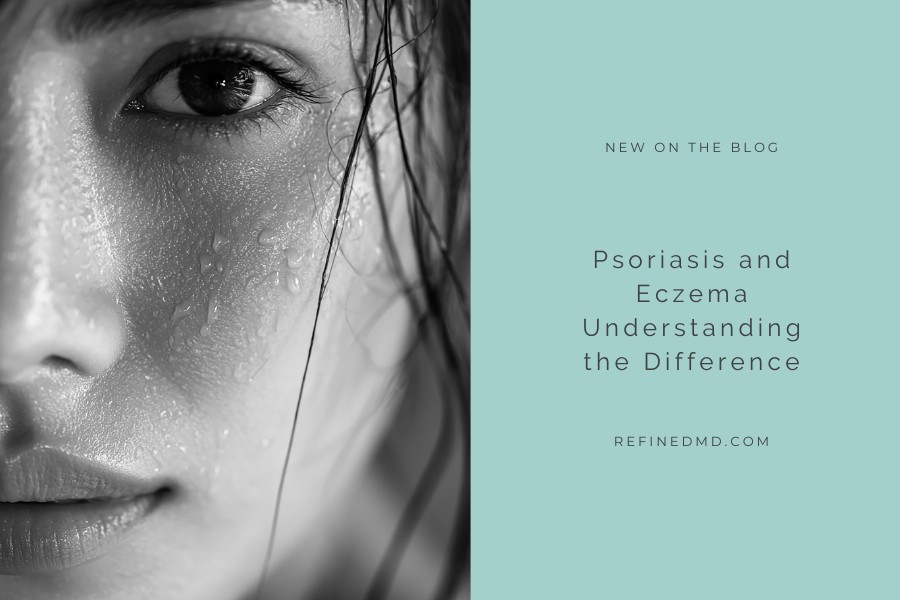
23 Nov Psoriasis and Eczema Understanding the Difference
RefinedMD helps patients navigate two of the most commonly confused skin conditions—psoriasis and eczema—both of which can cause red, scaly, or itchy skin that worsens during the colder months. While they may appear similar at first glance, psoriasis and eczema differ in their causes, triggers, and treatment approaches. Psoriasis is an autoimmune condition that speeds up skin cell turnover, producing sharply defined plaques with silvery scale. Eczema, or atopic dermatitis, results from a compromised skin barrier combined with immune hypersensitivity, often leading to oozing, cracked, or intensely itchy patches that may keep patients up at night.
Because these conditions overlap in appearance and location, accurate diagnosis is essential for effective management. Both can develop on elbows, knees, scalp, and hands—and both are sensitive to environmental stressors like cold air, dry heat, and friction. Dermatologists use history, dermoscopy, and sometimes biopsy to distinguish between the two. With precise identification, patients can move from endless flare cycles to targeted, lasting relief.
Why Winter Makes Psoriasis and Eczema Worse
Winter’s dry, cold air dehydrates the skin’s outer layer, triggering irritation and inflammation. At the same time, indoor heating further strips moisture, while reduced sunlight deprives the skin of natural ultraviolet exposure that helps suppress inflammation in psoriasis. This perfect storm of environmental stress leaves the skin vulnerable to flares and discomfort.
According to a 2025 report in Frontiers in Immunology, dermatology visits for psoriasis spike during winter as humidity drops and stress levels rise. The same environmental conditions can aggravate eczema by weakening the lipid barrier and allowing irritants to penetrate more easily. Add holiday stress, hot showers, or wool fabrics, and both conditions can quickly worsen. Preparing your skin care routine before temperatures drop is the key to staying ahead of seasonal flare-ups.
Understanding Their Overlap and Distinctions
Though psoriasis and eczema share redness, scaling, and itching, their textures and patterns differ. Psoriasis plaques are thicker, firmer, and often accompanied by nail pitting or stiffness in nearby joints. Eczema, by contrast, typically occurs in skin folds such as behind the knees or on the inner elbows, producing intense itch and possible oozing during severe flares.
However, the two can coexist or mimic each other. For example, psoriasis on the hands can look like chronic eczema, while facial eczema can appear similar to mild psoriasis. Because treatments differ—some targeting immune pathways and others focusing on barrier repair—self-diagnosis can prolong symptoms. Expert evaluation ensures your care plan addresses both the visible irritation and the internal inflammation driving it.
Effective Treatments Offered at Our Clinic
Our approach combines evidence-based medicine with individualized care. Topical corticosteroids remain the cornerstone for reducing inflammation in both conditions, though strength and formulation vary based on skin type and location. For delicate areas such as the face or eyelids, nonsteroidal anti-inflammatory creams like calcineurin inhibitors provide relief without the risk of thinning skin. Consistent use of emollients to rebuild the barrier is central to every plan.
For moderate to severe disease, we offer narrowband UVB phototherapy, a treatment that uses precise wavelengths of light to calm inflammation and restore healthy cell turnover. This therapy is safe, effective, and especially beneficial in the winter months when natural sunlight exposure is limited. When necessary, we coordinate with your existing dermatologist for advanced treatments such as biologics or oral medications to ensure comprehensive, long-term control.
Recent Advances in Psoriasis and Eczema Research
A recent publication in HCPLive highlighted new progress in topical and systemic therapies, including roflumilast 0.05% cream for eczema and next-generation biologics for psoriasis such as bimekizumab and other IL-17 and IL-23 inhibitors. These innovations continue to expand patient options, allowing for personalized treatment that balances potency with safety.
Additionally, studies have shown that early, proactive intervention not only improves visible outcomes but may also reduce the risk of chronic inflammation and comorbidities. The key takeaway from current research is clear: with the right treatment strategy, most patients can achieve long-term remission and significantly improved quality of life.
Winter Skin Care and Prevention Strategies
Managing psoriasis and eczema goes beyond prescriptions—it’s about protecting the skin barrier daily. Use fragrance-free cleansers, take lukewarm showers, and moisturize immediately afterward to lock in hydration. Humidifiers are excellent for maintaining indoor moisture levels, especially when heating systems are in constant use. Soft, breathable fabrics prevent friction, while a diet rich in omega fatty acids and hydration supports the skin from within.
Psoriasis patients benefit from gentle exfoliation with ingredients like salicylic acid or urea, which remove excess scale and help medications penetrate more effectively. Those with eczema should emphasize thick, ceramide-rich moisturizers twice a day to restore barrier integrity. Both benefit from stress reduction, consistent sleep, and mindfulness practices, as stress is one of the most reliable triggers for winter flares.
When to Schedule a Dermatology Visit
It’s time to see a dermatologist if you experience spreading plaques, constant itching, painful cracking, or signs of infection such as oozing or swelling. If your current routine is losing effectiveness or you’re unsure whether you have psoriasis, eczema, or both, a professional assessment is the first step to relief. Early intervention keeps symptoms mild, reduces flare duration, and helps prevent permanent skin thickening or discoloration.
With expert guidance, personalized treatment, and a consistent skin care plan, clear, comfortable skin is possible year-round—even in the harshest winter weather. Don’t wait until discomfort returns with the next temperature drop.
Contact RefinedMD today by calling our office or completing the online form to schedule your psoriasis or eczema consultation and start your personalized treatment plan this winter.
